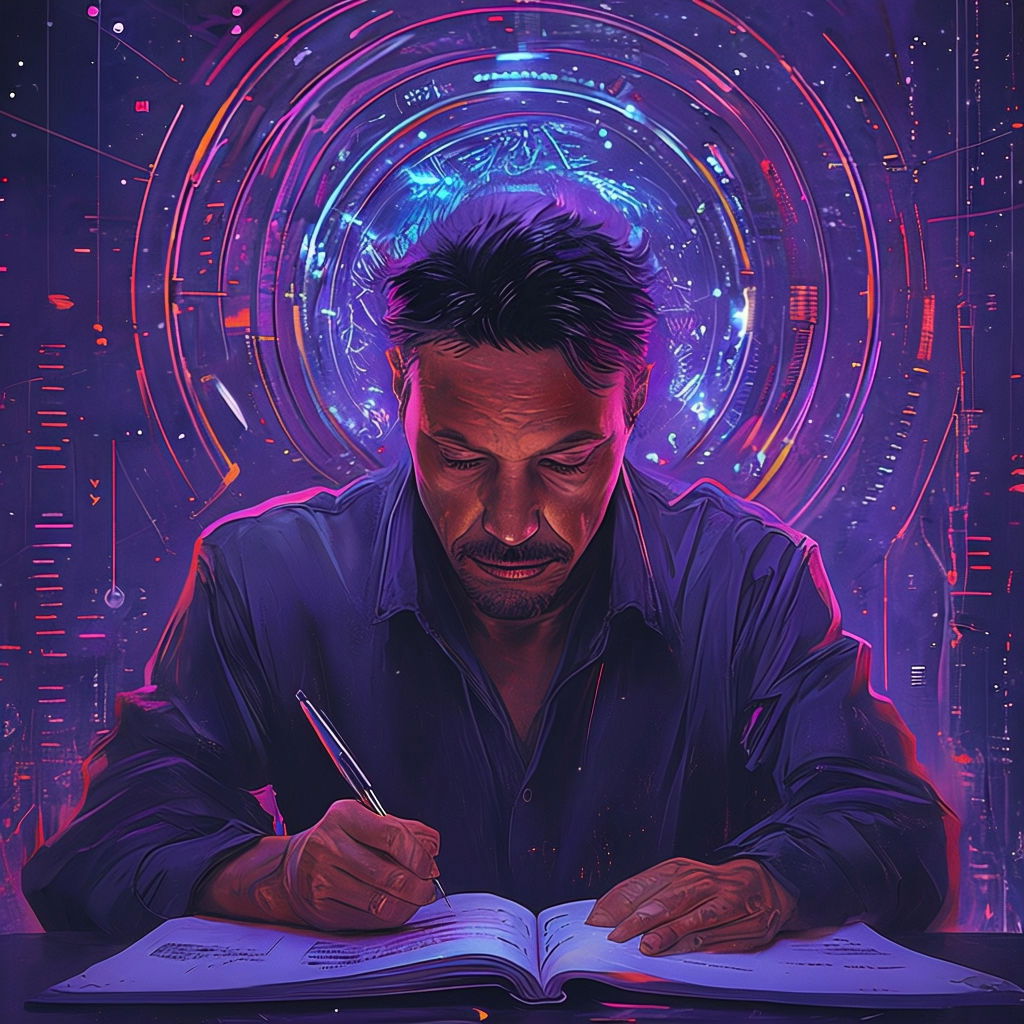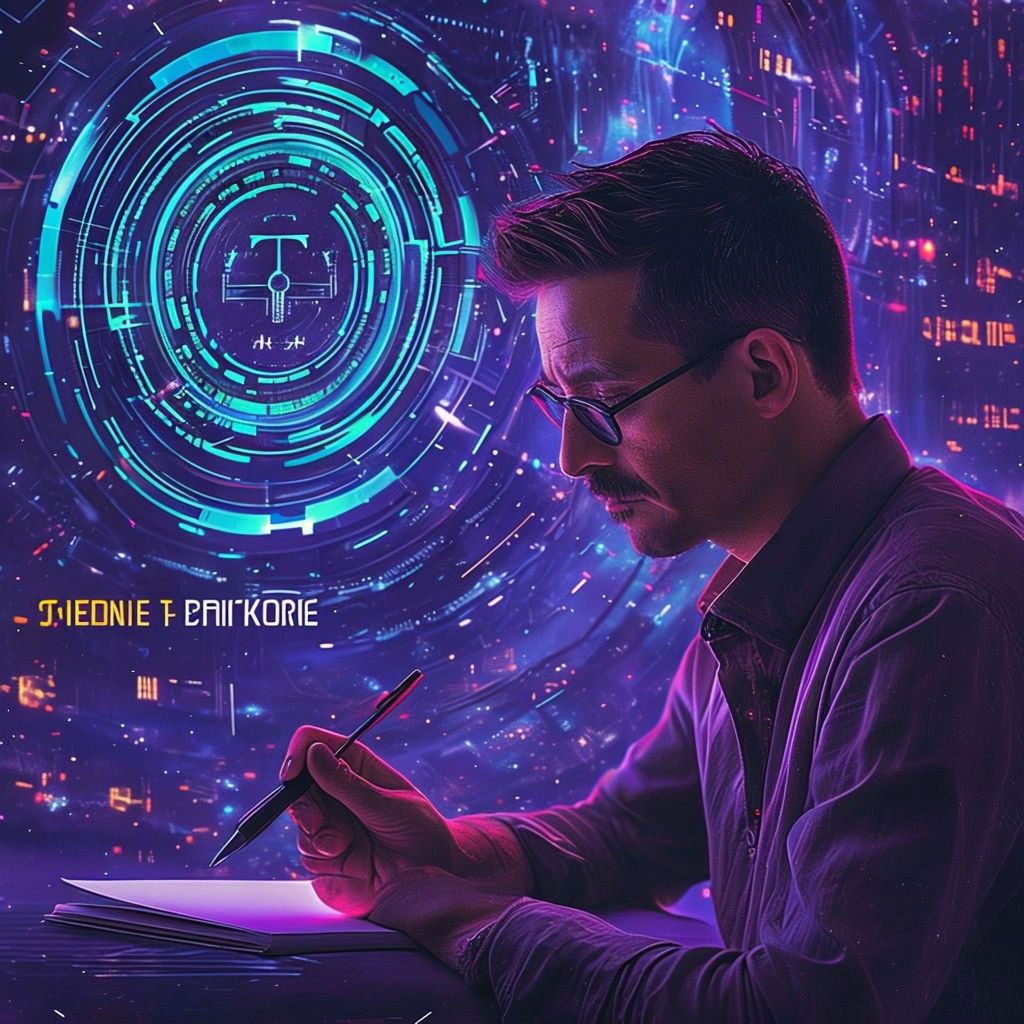Gnosis in the Cosmos : Stanislaw Lem’s Science Fiction and the Mysteries of the Unknown
Gnosis in the Digital Cosmos: Lem’s Path to Enlightenment
Stanislaw Lem, the celebrated Polish science fiction writer, is known for his profound explorations of intelligence, consciousness, and the cosmos. Lem’s work challenges readers to contemplate the limits of human knowledge and the mysteries of existence in a universe that is vast, indifferent, and often incomprehensible. Though Lem was a rationalist and often skeptical of traditional religion, his stories are steeped in philosophical spirituality, raising questions about humanity’s place in the cosmos, the limits of reason, and the nature of the unknown. His exploration of these themes creates a unique and contemplative vision of spiritual inquiry—one that is deeply rooted in humility before the immensity of the universe.
At the heart of Lem’s work is a recognition of the universe as an unfathomable and often indifferent force. His protagonists are usually scientists, explorers, and intellectuals, characters who rely on logic and empirical evidence, yet continually encounter mysteries beyond their understanding. Rather than finding answers, Lem’s characters often confront the limits of human cognition, revealing a spiritual humility that emphasizes the unknown over certainty.
In Solaris, one of Lem’s most famous novels, scientists aboard a space station study a vast, sentient ocean on the planet Solaris. Despite decades of research, the nature of Solaris remains elusive; it defies human comprehension and resists classification. The ocean creates “visitors” for the scientists—physical manifestations of their memories and regrets, as though Solaris is probing the depths of their subconscious. This intrusion forces each scientist to confront their own psyche, revealing that the greatest mysteries lie not only in the cosmos but within the human mind itself.
In Solaris, Lem presents an existential encounter with the unknown, a confrontation with something that operates beyond human categories. This notion—that the universe holds realities that are fundamentally unknowable—suggests a kind of cosmic spirituality, where humanity must accept its limits and embrace the mystery. Rather than seeking control or mastery, Lem’s work invites readers to adopt a posture of humility, to acknowledge the possibility that some truths may forever elude human grasp. This recognition of the unknown as sacred aligns Lem’s work with a form of philosophical spirituality, where the quest for knowledge is tempered by a profound respect for the ineffable.
Lem’s skepticism toward humanity’s capacity to fully comprehend the universe is also central to His Master’s Voice, a novel that examines the attempt to decode a message from an extraterrestrial civilization. A team of scientists is assembled to analyze this mysterious transmission, known as the “Message,” hoping to unlock its meaning. However, the team’s efforts ultimately reveal the vast limitations of human understanding. Despite their best efforts, the scientists cannot decipher the Message’s intent or even confirm if it was meant to be deciphered at all. The Message becomes a mirror, reflecting humanity’s limitations and assumptions back at them.
While Lem was skeptical of traditional religion and metaphysics, he recognized humanity’s need for meaning and connection in an otherwise mechanistic universe.
A recurring theme in Lem’s work is the notion of existential isolation. This theme of isolation can be seen as a modern echo of the existentialist and Gnostic idea that humanity is cut off from divine knowledge, left to wander in search of understanding that may never be achieved. Lem’s characters face a universe that offers no easy answers, a cosmos that resists their attempts at connection.
Yet, this isolation is not necessarily bleak; it encourages an inner journey, where individuals must confront their limitations and find meaning within themselves. For Lem, the true contact may not lie in discovering alien civilizations but in the introspective journey that such a search demands.
Though often skeptical of traditional religious beliefs, Stanislaw Lem’s work is infused with a spirituality that values wonder, inquiry, and humility. His vision of the universe is one that defies human control and understanding, a cosmos filled with mysteries that encourage introspection rather than conquest. In Lem’s view, the search for knowledge is a spiritual journey, one that reveals as much about humanity’s limitations as it does about the nature of reality.
Lem’s legacy as a writer is a testament to the power of science fiction to probe existential questions and to reflect on humanity’s place within the cosmos. His stories challenge readers to think beyond their assumptions, to question the boundaries of knowledge, and to embrace the mysteries that lie beyond human understanding. For Lem, spirituality is not found in certainty or revelation but in the act of questioning itself—in the willingness to confront the unknown with humility and respect.
--

Although Stanislaw Lem’s work predates the cyberpunk movement that would emerge in the 1980s, his stories lay much of the philosophical groundwork that cyberpunk would come to explore, particularly the themes of gnosis and the search for hidden truths within complex systems. For Lem, gnosis—the experiential knowledge of reality’s deeper nature—does not come through mystical revelation or divine intervention. Instead, it emerges from the intense, often painful realization of humanity’s limitations, a theme that resonates strongly with the cyberpunk ethos of navigating simulated worlds, digital labyrinths, and virtual identities.
Lem’s characters, much like the antiheroes of cyberpunk, seek knowledge and understanding within systems that resist clear interpretation. His vision of gnosis is a journey of intellectual humility, a kind of enlightenment achieved not through control or mastery but through surrender to the vastness of the unknown. In this way, Lem’s stories anticipate the cyberpunk protagonist’s existential struggle within the digital world—a quest to uncover hidden truths, not through technology’s power but through its limitations. Gnosis, for Lem, is about recognizing that ultimate understanding may be an illusion, even as the quest for it remains vital.
Proto-Cyberpunk Landscapes: Technology as Both Gateway and Barrier to Knowledge
Lem’s works often examine technology as a double-edged sword—a tool that promises insight yet obscures as much as it reveals. This ambivalence toward technology is central to cyberpunk’s approach, where technological systems can provide glimpses into the fabric of reality while also trapping characters within simulations and illusions. In Lem’s stories, technology often mirrors human limitations, exposing the gaps in human understanding rather than filling them. This vision aligns with the cyberpunk world, where technology reveals uncomfortable truths, exposing not only the instability of the world but the fragmented nature of identity.
For instance, in *The Futurological Congress*, Lem explores the idea of simulated realities that alter individuals’ perceptions of their world. Here, advanced drugs and virtual environments create an illusory reality where citizens are kept passive, their senses manipulated by technological interfaces.
This scenario mirrors the virtual realities and digital illusions that cyberpunk would later popularize, questioning the authenticity of experience and the power structures that maintain control. Yet, for Lem, even as technology mediates experience, it invites deeper reflection. The more his characters engage with artificial realities, the more they are pushed to confront the limitations of their perception, challenging them to seek a more profound understanding of the self.
Lem’s view of technology as both a means to knowledge and an obstacle resonates with cyberpunk’s portrayal of digital realms as spaces for self-discovery. Much like cyberpunk’s virtual worlds, Lem’s technological landscapes are not escapes from reality but intense encounters with the boundaries of human cognition. In these encounters, characters experience a kind of digital gnosis, an insight into the constructed nature of their surroundings and themselves.
Isolation, Gnosis, and the Quest for Identity in a Fragmented World

Cyberpunk often features protagonists who experience a profound sense of isolation within digital environments, a separation from reality that serves as both a prison and a crucible for self-knowledge. Lem’s characters, too, encounter isolation, though often on a cosmic rather than strictly digital scale. In *Solaris*, the scientists on the space station are isolated in their attempts to comprehend the sentient ocean, with each character forced to confront memories and desires they would rather avoid. This isolation becomes a space for gnosis, as characters delve into the painful process of confronting their own minds—echoing cyberpunk’s journeys through fragmented digital worlds where identity becomes fluid and elusive.
In Lem’s work, this journey toward gnosis is an inner quest as much as an outward search. His characters do not simply face the alien or digital other; they confront their own fragmented identities and assumptions. Lem’s exploration of self-knowledge is proto-cyberpunk in its depiction of gnosis as a form of self-interrogation within vast, alienating systems, whether biological or technological.
For Lem, as for cyberpunk writers, the discovery of truth is inextricably linked to the dissolution of the self, a dismantling of preconceived notions that reveals the complexities of consciousness and identity.
The Cyberpunk Legacy: A Spirituality of Complexity and Skepticism
Although Lem’s work does not focus on the neon-lit cities and digital underworlds that characterize cyberpunk, his philosophical approach to technology, identity, and spirituality finds a natural home within the genre. Cyberpunk’s fascination with artificial intelligence, virtual reality, and digital consciousness echoes Lem’s belief in the complexity of existence and the necessity of questioning perceived realities. Just as Lem’s protagonists encounter unknowable alien intelligences and ethical dilemmas in technology, cyberpunk protagonists confront powerful AI systems, corporations, and virtual constructs that challenge their understanding of self and truth.
Lem’s stories anticipate cyberpunk’s spiritual skepticism, a view of enlightenment not as a comfortable answer but as an ongoing struggle. For both Lem and the cyberpunk genre, gnosis involves confronting the limits of human agency and recognizing the constraints imposed by society, technology, and one’s own mind. In this sense, Lem’s spirituality aligns with cyberpunk’s quest for a deeper truth that is not offered freely but must be pursued through resistance and resilience.
Beyond the Digital: Lem’s Vision of Gnosis in the Infinite Cosmos

While cyberpunk often focuses on the digital or virtual, Lem’s stories extend the search for knowledge and identity into the boundless cosmos, presenting the unknown as both a physical and spiritual reality. In Lem’s view, the universe itself is a mystery far greater than any virtual system or AI, an infinite expanse that continually challenges humanity’s self-conception. Lem’s gnosis lies in understanding humanity’s limitations within this cosmic context, a recognition that we may never fully comprehend the universe’s underlying order—or disorder.
Lem’s cosmic gnosis offers a sense of spiritual humility, a recognition that the path to understanding may lie not in mastery but in surrender. This resonates with cyberpunk’s explorations of knowledge through digital systems, where characters must learn to navigate artificial realities while embracing the unknowability of their worlds. Lem’s vision expands this journey, placing it within an infinite universe where humanity is but a small, questioning presence, seeking meaning in a vast, indifferent reality.
Conclusion: Stanislaw Lem’s Spiritual Legacy and the Cyberpunk Ethos
Stanislaw Lem’s work bridges the gap between traditional science fiction and the philosophical underpinnings that would come to define cyberpunk. His exploration of the limits of knowledge, identity, and humanity’s place in the universe offers a deeply spiritual perspective grounded in intellectual humility and existential curiosity. While Lem’s characters confront cosmic mysteries rather than solely digital ones, his works share cyberpunk’s skepticism toward easy answers and embrace of the unknown.
Lem’s legacy lies in his invitation to readers to engage with the complexity of existence, to seek knowledge not for mastery but for the growth of consciousness. In a world increasingly mediated by technology, Lem’s vision remains profoundly relevant, encouraging a spirituality of inquiry, skepticism, and wonder.
His works remind us that whether we explore the depths of space or the layers of digital reality, the search for understanding is both a scientific and spiritual journey, one that invites us to grapple with the mystery and magnificence of the unknown. Through his stories, Lem offers a pathway to a kind of modern gnosis, a wisdom that emerges not from certainty but from an enduring quest for truth in an ever-expanding, enigmatic cosmos.
--
A BONUS EXTRA SHORT STORY IN THE STYLE OF STANISLAW LEM:
Dr. Elias Kord stood alone in the Observatory of the Edge, a station built on the rim of the known galaxy. For years, he’d dedicated himself to a single task: decoding the Silence—an incomprehensible signal resonating from the void, present everywhere yet unfathomable in content. Scientists had speculated that it was a message, a cosmic truth whispered from the depths of an indifferent universe. But nothing decipherable had emerged, only static.
One evening, after countless attempts, Dr. Kord closed his eyes, letting exhaustion guide him into a quiet, unexpected place of surrender. In that silence, something profound surfaced—not a message but an understanding. The "Silence" wasn’t an external signal; it was the echo of his own mind reverberating back through the vast expanse. The universe was not speaking to him because, in some indescribable way, he was the universe observing itself, the observer and the observed, both the signal and the silence.
In that instant, Kord felt an overwhelming realization, a deep gnosis that seemed absurdly simple: he was not separate from the stars, the distant worlds, or the vast emptiness. He was the entirety of it all, a point of awareness in an infinite, self-contained cosmos.
When he opened his eyes, the universe remained silent, indifferent as always. But for Kord, it was no longer an empty void. It was himself—everything, everywhere, eternally whole.

Stanislaw Lem was a pioneering Polish science fiction author and philosopher whose works explore humanity's relationship with technology, consciousness, and the mysteries of the cosmos. Born in 1921, Lem witnessed profound historical upheavals, which influenced his critical perspective on human nature and intellectual limitations. Unlike traditional sci-fi, Lem’s narratives focus less on action and more on philosophical questions, using speculative concepts to probe the limits of human knowledge and perception.
Among his most acclaimed works are *Solaris*, a story about scientists grappling with a sentient alien ocean, and *His Master’s Voice*, which examines humanity’s struggle to decode an alien message, highlighting the boundaries of understanding.
Lem also wrote *The Cyberiad*, a satirical collection featuring two robot inventors, blending humor with complex reflections on creativity and ethics.
Lem’s influence reaches beyond literature into philosophy and AI ethics, where his cautionary tales continue to shape conversations around technological progress. His legacy is that of a writer who used science fiction to challenge assumptions, urging readers to embrace humility before the vast unknown of the universe.
While Stanislaw Lem’s work predates the cyberpunk movement, his writing laid significant groundwork for its themes by exploring technology's ethical dilemmas and the alienation inherent in digital and mechanical systems. Lem often portrayed advanced technology as both a marvel and a mirror, reflecting human limitations rather than offering straightforward solutions.
His stories feature protagonists who, like cyberpunk’s iconic antiheroes, grapple with complex, opaque systems that resist control or understanding, emphasizing humanity’s fragile position in a technologically dominated world. This skeptical, introspective approach to technology and identity resonates with cyberpunk’s core philosophy, blending intellectual inquiry with existential caution.
CYBERPUNK FUTURE!